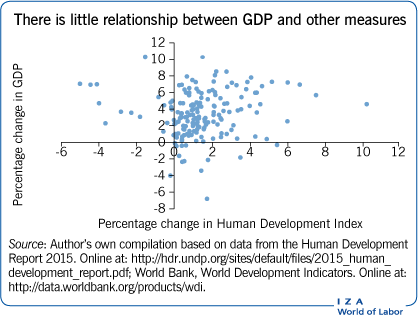Elevator pitch
Gross domestic product (GDP) is the key indicator of the health of an economy and can be easily compared across countries. But it has limitations. GDP tells what is going on today, but does not inform about sustainability of growth. It does not measure happiness, so residents can be dissatisfied even when GDP is rising. GDP does not consider environmental factors or reflect what individuals do outside paid employment. It might increase in times of military conflicts and after natural disasters or terrorist acts, as the loss of property is not counted. Hence, complementary measures may help to show a more comprehensive picture of an economy.

Key findings
Pros
GDP provides a headline number to focus on the economic condition of a country.
GDP is the mainstay of modern macroeconomic analysis and essential to policy creation.
Because GDP conforms to international measures of production, it is an objective indicator that is not subject to national political pressures.
In most cases, GDP uses well-established international accounting principles.
GDP concepts are modified as the economy changes.
Cons
GDP does not capture welfare or human well-being.
GDP may not be a strong basis to predict economic growth in times of high uncertainity.
As international accounting standards are slow to change and require international consensus, GDP is slow to reflect changes in the world.
GDP excludes non-market activity, notably human capital creation in that sector.
Important indicators such as ecosystems accounts, measures of happiness, sustainability, or inequality are not included in GDP, other than through satellite accounts.